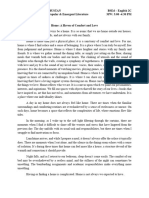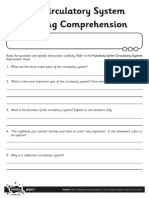Home is more than a physical structure of walls, windows, and doors—it is the very foundation
of belonging. It is often described as the place where one feels most at ease, where comfort and
familiarity live side by side. While many think of home as the house where they were born and
raised, its meaning reaches far deeper. Home can be a single room, a bustling city, or even an
entire country. For others, home is not a place at all but rather the presence of a person, family,
or community who makes them feel secure.
At its core, home represents comfort and safety. It is the space where individuals can remove
their masks, embrace vulnerability, and be truly themselves. It offers protection from the outside
world and serves as a refuge after work, travel, or hardship. Within its walls, traditions are
nurtured, meals are shared, and routines unfold with quiet certainty. Home is often filled with
laughter, stories, and even silence that feels safe, reminding us that peace can be found in
stillness as much as in joy.
The idea of home extends beyond shelter. It holds memories, emotions, and identity. Childhood
homes become the first schools of love, discipline, and belonging. They are the spaces where
family ties are strengthened and where lessons of care and responsibility take root. For adults,
home becomes a retreat, a place to start anew, and a foundation upon which dreams are built. It
is a space that witnesses both joy and grief, a sanctuary where celebrations are cherished and
sorrows are comforted.
Yet home is not always perfect. For some, it carries conflict, struggles, or painful memories.
Even so, it remains a powerful force in shaping resilience, growth, and the desire for something
better. For those who are displaced or homeless, the meaning of home shifts—it may be a
temporary shelter, a park bench, or simply the longing for a place of safety. For travelers, home
becomes the destination of return, the place their hearts ache for despite distance.
What makes home enduring is not its permanence but its essence. A dormitory, a rented
apartment, or even an ancestral house passed down for generations can all be home, depending
on the care and love found within them. It is as much defined by relationships as by geography,
constantly evolving as people move, migrate, and create new lives. Home is built not just with
bricks but with memories, tenderness, and effort.
Ultimately, home is the sanctuary where one feels safe, valued, and at peace. It is where
identities are formed, where bonds are woven, and where the heart always seeks to return. Home
is not just where you live—it is where you belong.
























































































